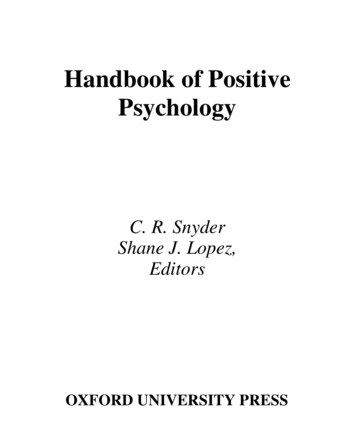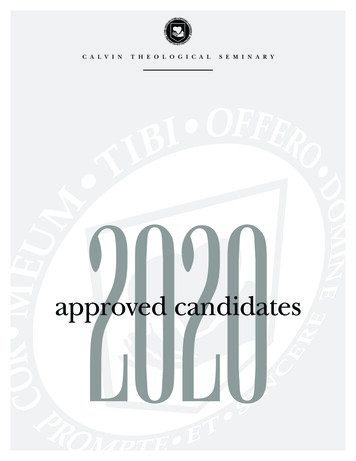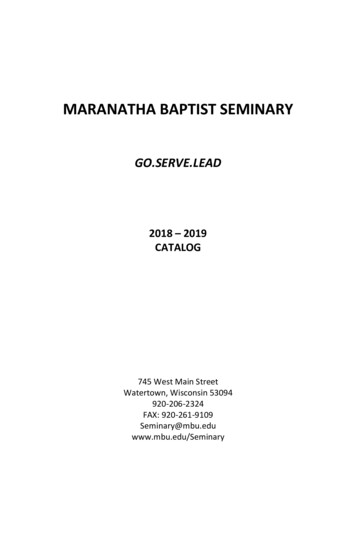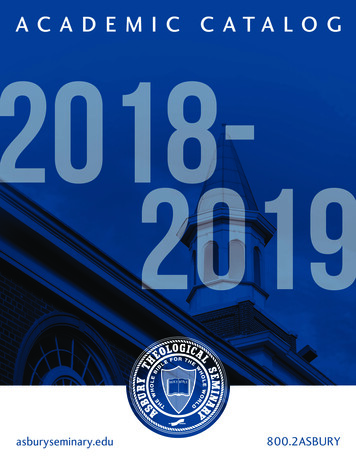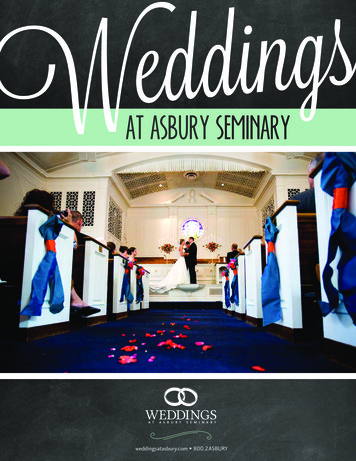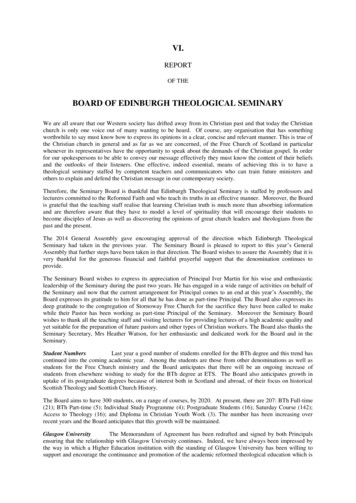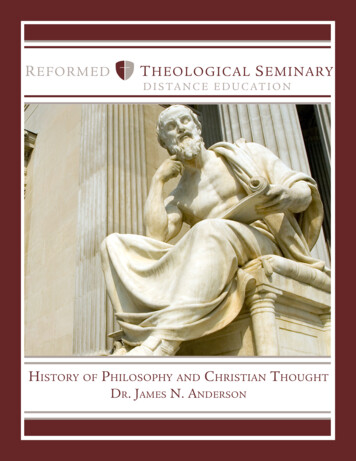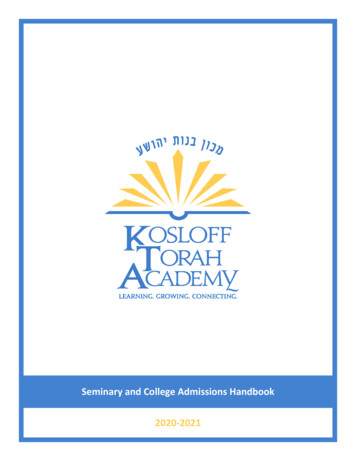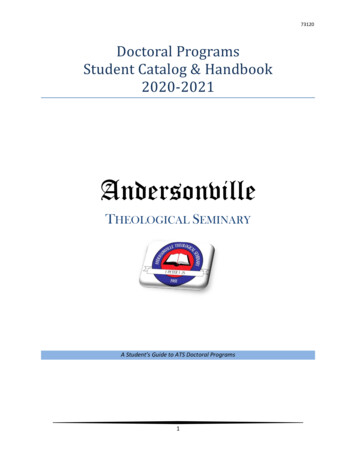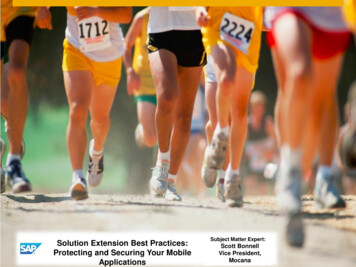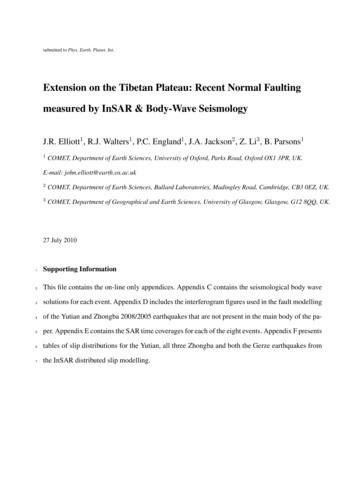
Transcription
SEMINARY EXTENSIONA ministry of the Southern Baptist Convention, under the directionof the Council of Seminary Presidents of the six Southern Baptistseminaries, equipping God’s people for Christian ministry aroundthe world since 1951CATALOGFALL 2020-SPRING 2021Seminary Extension901 Commerce St., Suite 500, Nashville, TN 37203Phone (615) 242-2453, Fax (615) 782-4822Toll-free: 1-800-229-4612E-mail: on.orgCatalog effective dates: August 2020 thru July 20211
Table of ContentsTHEC . 3SEMINARY EXTENSION MISSION STATEMENT . 3OUR FAITH STATEMENT . 4OUR GOVERNANCE AND GUIDANCE . 4FACULTY . 4BUILDING AND FACILITIES. 5HIGH QUALITY—LOW COST . 5HISTORY AND TRADITION OF SEMINARY EXTENSION . 5TRADITION OF SERVICE . 7A LETTER FROM THE DIRECTOR . 8SEMINARY EXTENSION COURSES . 9METHODS OF STUDY. 10GROUP (LOCAL OPPORTUNITIES) . 10INDIVIDUAL STUDY (CORRESPONDENCE) . 10SEMINARY EXTENSION PROGRAMS . 10CERTIFICATE PROGRAMS . 11DIPLOMA PROGRAMS. 13GENERAL OBJECTIVES OF CURRICULUM AREAS . 19INDIVIDUAL COURSE DESCRIPTIONS . 19BIBLICAL STUDIES CURRICULUM . 19ETHICS-HISTORY-THEOLOGY CURRICULUM . 27PRACTICAL MINISTRY CURRICULUM . 31FEES AND CHARGES . 37SEMINARY EXTENSION POLICIES. 39ADMISSION . 39ATTENDANCE POLICY . 39CALENDAR . 39INSTITUTIONAL ENROLLMENT PERIOD . 39TEXTBOOKS . 40GRADING . 40GRIEVANCE . 41PLACEMENT SERVICES . 412
TRANSCRIPTS/TRANSFERABILITY OF CREDIT . 42REQUESTING A TRANSCRIPT . 42CREDIT FROM OTHER SOURCES . 42OUR RELATIONSHIP WITH OTHER SBC INSTITUTIONS . 43STUDYING WITH SEMINARY EXTENSION . 43STUDENT CONDUCT . 45STUDENT CODE OF CONDUCT . 46CANCELLATION AND REFUND POLICY . 47THECSeminary Extension is authorized by the Tennessee HigherEducation Commission. This authorization must be renewed eachyear and is based on an evaluation by minimum standardsconcerning quality of education, ethical business practices, andfiscal responsibility.In order to view detailed job placement and graduation informationon Seminary Extension programs, please visit www.state.tn.us/thecand click on the Authorized Institutions Data button.Under its current procedures, the Tennessee Higher EducationCommission at each quarterly meeting shall considerrecommendations from the Commission staff and/or PostsecondaryEducation Institution Committee regarding all authorizations,awarding educational credentials (including authority to grantdegrees) and any other matter at the request of the Commission’sExecutive Director.No institution may solicit, recruit, award credentials or operate as apostsecondary educational institution until such authorization isgranted by affirmative vote of the Commission.Seminary Extension Mission StatementThe mission of Seminary Extension is to provide theologicaleducation and ministry training of excellent quality to churchleaders and members where they live.3
Our Faith StatementThe doctrinal/theological principles under which SeminaryExtension operates are those set forth in the 2000 Baptist Faith andMessage. You may access a copy of this statement at sbc.net.Should a different view be expressed in textbooks used with ourcourses, please know that it may not always reflect our doctrinalposition.Our Governance and GuidanceSeminary Extension is a ministry of the Southern BaptistConvention under the governance of the Council of SeminaryPresidents, which is a board comprised of the six presidents of theSouthern Baptist Convention Seminaries. Dr. Daniel L. Akin, Southeastern Baptist SeminaryDr. Jason K. Allen, Midwestern Baptist Theological SeminaryDr. James K Dew, New Orleans Baptist Theological SeminaryDr. Jeff Iorg, Gateway Seminary of the Southern BaptistConventionDr. Adam W. Greenway, Southwestern Baptist TheologicalSeminaryDr. R. Albert Mohler, Jr., The Southern Baptist TheologicalSeminaryFacultySeminary Extension is very pleased to have instructors that areacademically qualified and that have years of experience in the fieldof study. Dr. Randal A. Williams has his Ph.D. in Preaching, NewTestament Literature and Theology and his M.Div. inTheology from The Southern Baptist Theological Seminaryand his B.A. in Theology from the Baptist College of Florida.He also serves as the director of Seminary ExtensionDr. Dennis Pulley has his D.Min. in Expository Preachingfrom Trinity Evangelical Theological Seminary, his M.Div. inTheology from The Southern Baptist Theological Seminaryand his B.A. in Religion4
Mr. Vertis Butler has his M.Div. in Theology fromSouthwestern Theological Seminary, his M.A. in NewTestament studies from Wheaten College and his B.S. inSecondary Education from Tennessee TechnologicalUniversityBuilding and FacilitiesSeminary Extension is in the Southern Baptist Convention Buildingin Nashville. The Southern Baptist Historical Library and Archivesis incorporated with us under the Council of Seminary Presidents.Seminary Extension is a distance educator and our address is 901Commerce Street, Suite 500, Nashville, TN 37203.High Quality—Low CostSeminary Extension is completely self-supporting. By holding ourexpenses to the bare essentials, Seminary Extension is able to offerhigh quality courses at a low cost. We are committed to keeping ourcost low so that cost does not become an insurmountable obstacle toindividuals seeking theological education and ministry training.History and Tradition of Seminary ExtensionIn the years following World War II, Southern Baptists becameaware that many of their pastors had only limited formal educationfor ministry. A denominational study committee reported in 1949that less than one-third of Southern Baptist ministers had bothcollege and seminary training. At that time, another third had notgone past high school. One of several recommendations from thatcommittee called for the creation of a plan to benefit those “whocannot or, for any reason, do not attend some regular institution oflearning.” The presidents of Southern, Southwestern, and NewOrleans seminaries responded in December 1950 by voting toestablish the Seminary Extension Department.R. Lee Gallman, an Alabama pastor, was elected the first director ofthe program. Seminary Extension officially began operation in theMississippi Baptist Building on June 15, 1951. Developingseminary type courses was Gallman’s first task. Among those firstcourses were some on the Old and New Testaments, homiletics, and5
Christian doctrine. The first students were enrolled forcorrespondence study. Extension centers were set up within the firstyear, however, and by the fall of 1952 they were operating in atleast six states. By the time Gallman resigned in 1960, more than3,000 students were enrolled.Although not a part of the Southern Baptist Seminaries themselves,Seminary Extension has the support of our Seminaries. In its earlyyears more than 90 percent of its operating budget came from theseminaries. Seminary Extension no longer receives monetarysupport from the seminaries. However, their support is still presentin other ways. The six presidents of the Southern BaptistConvention seminaries constitute Seminary Extension’s governingboard, and their chief academic officers make up its academiccouncil. Faculty members from the seminaries have written, andcontinue to write, Seminary Extension courses.North Carolina pastor Ralph A. Herring became director in 1961,serving until 1968. Under his leadership the number of courseofferings continued to expand, and in 1963 the offices were movedfrom Jackson, Mississippi to Nashville, Tennessee, to the SouthernBaptist Convention Building. Seminary Extension experiencedcontinuous growth through the decade of the 1970s.Raymond M. Rigdon became director in 1969. He concentrated onupgrading the quality of the courses while continuing to expand thecurriculum. A major step during his administration was gainingaccreditation for the correspondence program through the NationalHome Study Council. We are no longer associated with DETC, butwe continue to benefit from our former relationship with them.From 1981 to 1990, Seminary Extension was part of the SeminaryExternal Education Division. A new Seminary Studies Departmentoffered master’s level courses at up to seven sites around thecountry. Those off-campus programs were placed under theadministration of individual seminaries in 1990, and the newdepartment and division were dissolved.Doran C. McCarty, a former faculty member at MidwesternSeminary, The Southern Baptist Seminary, and Golden Gate BaptistTheological Seminary, served as executive director of SeminaryExtension from August 1, 1988 through December 31, 1996. Underhis leadership, Seminary Extension expanded to about 450 centers6
and served over 6,000 students in the United States and abroad.W. Edward Thiele, a professor from New Orleans Seminary,assumed the role of executive director on January 1, 1997. Underhis leadership, Seminary Extension embraced a new millennium,and its fiftieth anniversary, by revising its methodologies, strategies,and delivery systems.William E. Vinson, a professor at Southwestern Seminary and itsDirector of Undergraduate and Lay Theological Studies, became thedirector in August 2001. He placed Seminary Extension on a soundfinancial footing and then used the vehicle to extend soundtheological education around the world.With the retirement of Dr. Vinson in May 2007, the Council ofSeminary Presidents chose Randal A. Williams. His goal is tocontinue the tradition of offering excellent theological educationand ministry training to Southern Baptists where they live. To reachthis goal, Seminary Extension has revised and repackaged itscurriculum and now uses an ongoing editing process as it printsmaterials on demand.Tradition of ServiceSeminary Extension’s learning resources are rooted in a deepreverence for the Bible as the divinely inspired Word of God andthe authoritative guide for human conduct. Seminary Extension’sinterpretation of God’s Word is in keeping with the 2000 BaptistFaith and Message. Its curriculum and resources grow out of theconviction that God expects Christians to search the Scriptures withopen and inquiring minds in order to know and follow God’s will.Therefore, Seminary Extension designs its courses to assistChristians in the serious academic study of the Bible and itsteachings in order that they may become effective in Christianministry.7
A Letter from the DirectorWe live in an ever changing world.Nevertheless, the challenges we facetoday are not unlike those faced by firstcentury believers. The messageproclaimed by the world then and now isthat “we had better enjoy everything wecan now because life is short”. But thatmessage denies the eternity, fails toexplain how eternal life with God is possible, and incorrectlydefines abundant life now. Like then, people come from manydifferent walks of life. Some are from cultures where the God of theBible is recognized as the only true and living God. Others believein a, or in some cases many, different gods. Still others are unsuresaying that if god does exist then god’s existence may be revealedin many different ways to different people or people groups.As Christians, these differences should not surprise us. As Paulreminds us, God’s way of salvation is not based on human ideas andliving for God will never make worldly sense (1 Cor. 1:18-25).So how do we figure out God’s ways? The New Testament Churchfigured them out through the careful and deliberate study of theBible, God’s word. The need for this kind of study was importantregardless of their background. Acts provides us with a greatexample of a religious, flamboyant, capable, and by all humanaccounts godly man named Apollos that needed such study in orderto get things right.In Luke’s description of Apollos in Acts 18, we see that he wasgifted and on fire for God. The problem was that he lacked a rightor more complete understanding of God’s ways. So God usedPriscilla and Aquila to help him to better understand His ways.A search of the book of Acts before this event reveals that Paul hadspent time with Pricilla and Aquila training them. Don’t forget,however, that Paul had also needed some training, part of whichcame from Barnabas. As I study the Bible, it is obvious to me thatGod has used similar chains of training to equip godly men andwomen who then train/mentor other men and women for the workto which He has called them.8
In 1949 the Southern Baptist Convention recognized the need tomake theological education and ministerial training available tomore Southern Baptists. After that study, they also noted that it wassimply not possible for everyone to go to a Seminary. So in 1951the SBC started the Seminary Extension program. Since that time,Seminary Extension has provided an affordable and effectivevehicle for delivering off-campus theological education andministry training opportunities for “pastors” and volunteers alike.In 2 Timothy 2:15, Paul reminded Timothy and, by implication,believers of all ages that we are to study God’s word so that it maybe rightly applied to our lives. Study and application of this kindmeans that believers must do more than simply read God’s word.They must drink deeply from it for life, refreshment, and service.Commitment to the in-depth study of God’s word is strengthenedwhen men and women are encouraged and guided by giftedmentors.If the Church today is going to effectively refute the world’sanswers to life’s deepest questions, then the Church had better knowwhat God says.With these truths in mind, Seminary Extension provides anopportunity for biblically accurate theological education andministry training to every interested believer. We do not seek toreplace a seminary education, but instead focus on those who cannotattend a seminary. Our courses are biblical and they reflect thevalues and theology of the Southern Baptist Convention, as they arestated in the 2000 Baptist Faith and Message.Seminary Extension CoursesSeminary Extension offers more than fifty courses. Our courses areideally suited for persons who have completed high school or theirGED. Individuals may enroll in our courses without providing uswith their high school transcript or GED transcript. However, anofficial transcript MUST be in our files before these courses can beused to complete a Seminary Extension certificate/diploma.Students who want to transfer these courses to another institutionmust provide us with an official high school transcript or GEDtranscript. (See the section entitled “SE Policies, Transcripts”.)9
Although many institutions accept credits earned through SeminaryExtension, we must inform you that no institution is required to doso. If you intend to transfer Seminary Extension credits to anotherinstitution, you should contact the institution to which you intend totransfer credit before enrolling in a Seminary Extension course.Seminary Extension courses provide an excellent learningopportunity for all church members, including volunteer orlaypersons, bivocational ministers, fully-compensated ministers,and individuals who are simply interested in personal spiritualgrowth. So it does not matter if you are just starting in yourChristian walk or you are a seminary graduate, you will find thesecourses helpful as you seek to minister as a part of God’s church.Methods of StudyFor your convenience, Seminary Extension offers two methods ofstudy: Group study and Self-directed Independent study.Group (Local Opportunities)Many SBC state and local associational offices recognize the valueof Seminary Extension training and offer to help students in theirareas by providing a place for students to meet and study SeminaryExtension courses. In this option, students study with friends andneighbors under the guidance of a mentor from their area that hasbeen approved by Seminary Extension using Seminary Extensionmaterials. Call us for locations and contact information in your area.Individual Study (Correspondence)This method is the foundation for all Seminary Extension courses.In this method, students simply study in their own setting viacorrespondence with a qualified instructor. Once you order yourcourse, we send you the materials and you simply study at your ownpace. The minimum length for a course is 6 weeks, but studentsmay take up to 6 months to complete each course. Students mayenroll in a maximum of two courses at a time.Seminary Extension ProgramsSeminary Extension currently has seven active programs. However,Seminary Extension is more than a program-centered educationalorganization. We promote the concept that Christians should be life-10
long learners. Therefore, students are not required to enter aprogram in order to take our courses and they are encouraged totake as many individual courses as they can for as long as they can.Students that do choose to enter a program often do so because theywant to work toward a specific goal, giving them a well-roundededucational experience in a particular area of ministry. Others enterSeminary Extension programs because they believe our programscan help to equip them for positions of service in the local church.As Southern Baptists, we do not believe that any program or degreeis required to serve in the kingdom of God. However, we atSeminary Extension believe that completing a program of studyshows evidence of a desire to be better servants through the study ofbiblical, theological and practical ministry courses.Certificate Pr
Orleans seminaries responded in December 1950 by voting to establish the Seminary Extension Department. R. Lee Gallman, an Alabama pastor, was elected the first director of the program. Seminary Extension officially began operation in the Mississippi Baptist Building on June 15, 1951. Developing seminary type courses was Gallman’s first task.File Size: 1MBPage Count: 49
